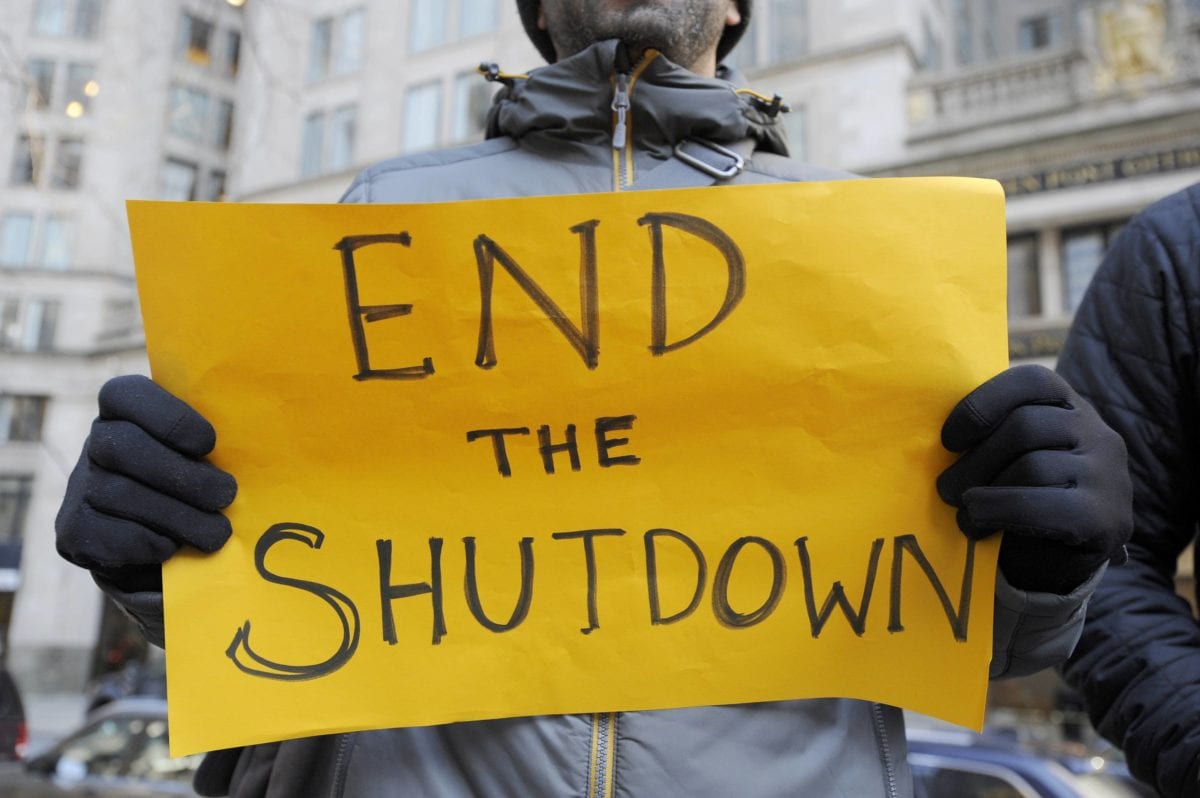By Glynn Wilson –
MOBILE, Ala. — The impacts of the ongoing threat to national security from the federal government shutdown orchestrated by President Donald J. Trump continued to widen and grow even more critical this week as the implications began to trickle out in news coverage, even threatening to lead to an economic recession, according to knowledgeable sources.
In one of the latest developments on Wednesday, U.S. House Speaker Nancy Pelosi wrote Trump a letter asking him to reschedule his annual State of the Union address before Congress due to the partial government shutdown and problems with security, according to coverage from Reuters.
Since the Secret Service is the lead agency responsible for coordinating and planning security for the event, and agents are working without pay and Homeland Security workers have also not been funded for 26 days, she said, “critical departments (are) hamstrung by furloughs.”
“Sadly, given the security concerns and unless government re-opens this week, I suggest that we work together to determine another suitable date after government has re-opened for this address or for you to consider delivering your State of the Union address in writing to the Congress on January 29th,” she wrote in the letter, adding that preparing for the event takes weeks of detailed planning. The president’s security and the security of Congressional leadership is a matter of national security.
The federal government has been partially shut down since Dec. 22 due to Trump’s demand for $5.7 billion to build a wall along the U.S. southern border, claiming a national security crisis. Democrats are standing firm in their refusal to cave in to the president’s demand, affirming that no wall on the southern border does not pose a national security threat or a crisis.
There appears to be no end in sight to the shutdown, since Senate Majority Leader Mitch McConnell has refused to even allow debate on bills to reopen the government and partially fund border security unless the president agrees to sign them into law.
The White House had no immediate comment on Pelosi’s letter, according to Reuters.
FBI Says Shutdown Threatens National Security
Perhaps even more critically, according to reporting first from The Atlantic, FBI agents are now saying the Trump shutdown is no doubt a threat to national security.
“They’ve weathered blistering attacks from the president, the exposure of sensitive sources, and the politicization of classified information,” the news website reported. “And now they’re not getting paid.”
“I’m not going to try to candy-coat it,” Tom O’Connor, a special agent and president of the FBI Agents Association, said this week. “We really feel that the financial insecurities we are facing right now equate to a national-security issue.”
The FBI Agents Association sent a petition to the White House and Congressional leaders last week signed by representatives of all field offices across the country warning of the effect of the continued government shutdown on agents and their work. The petition urges leaders in Washington, D.C. to immediately fund the FBI.
“We urge our elected representatives to fund the Department of Justice and the FBI because financial security is a matter of national security,” the association says in a press release announcing the petition.
Since FBI Special Agents are subject to high security standards that include rigorous and routine financial background checks to ensure that agents are financially stable and responsible, they say, missing payments on debts could create delays in securing or renewing security clearances, and could even disqualify agents from continuing to serve in some cases. The operations of the FBI require funding, they emphasize.
“As the shutdown continues, Special Agents remain at work for the American people without being paid, and FBI leadership is doing all it can to fund FBI operations with increasingly limited resources,” it says. But “this situation is not sustainable. The important work done by the bureau needs to be funded immediately.”
Pay uncertainty undermines the FBI’s ability to recruit and retain high-caliber professionals as well. Special Agents are skilled professionals who have a variety of employment options in the private sector, the union says. The ongoing financial insecurity caused by the failure to fund the FBI could lead some FBI agents to consider career options that provide more stability for their families.
“As those on the frontlines in the fight against criminals and terrorists,” they say, “we urge expediency before financial insecurity compromises national security.”
Mobile FBI
In attempting to localize this reporting in Mobile, Alabama, I tried contacting the FBI office here. No one answered the telephone. I left a message for the person in charge of dealing with press inquiries, but have so far heard nothing back. I will update this story after an in person trip to the local FBI office and the new federal courthouse here later today (Wednesday).
The notice posted on the FBI’s website should be concerning in and of itself, however, in light of our recent reporting on the imminent threats to national cybersecurity from the Trump shutdown.
“Due to the lapse in appropriations, Department of Justice websites will not be regularly updated. Please refer to the Department of Justice’s contingency plan for more information.”
So clearly the personnel in charge of the agency’s computers and websites, either furloughed government workers or private contractors or both who are not on the job because they are not being paid, are not there to deal with risks or warn agents or the public of any threats — leaving a significant vulnerability in national cybersecurity.
Agency Morale
Morale at the FBI had already been steadily declining for months before the government shutdown, according to current and recently departed agents who spoke to The Atlantic reporter on the condition of anonymity “to discuss their feelings candidly.” President Trump’s open warfare on the bureau has made agents’ jobs more difficult, they say, as trust in the FBI wanes among people who identify as Republicans and right-leaning independents.
“Part of it is Trump’s constant attacks,” said one agent who left late last year. “Bigger than that, though, is that it seems like a portion of the population believes him. Which makes their jobs harder to do.”
Another agent who left the bureau last year said certain leads that might be politically controversial were sometimes tabled indefinitely because they were not seen as “worth incurring the wrath of the Trump White House.”
In the two and a half years since the FBI launched its counterintelligence investigation into potential coordination between members of Trump’s campaign and Russia, first reported by the New York Times, the president has chided the FBI, former FBI Director James Comey, Special Counsel Robert Mueller, the Russia “witch hunt,” and the “deep state” in dozens of tweets, rallies and interviews.
Last April, he called the FBI and Justice Department’s desire to withhold sensitive information related to the ongoing investigation “an embarrassment to our country.” The withering morale and possibility of having to work without pay has made it increasingly difficult to recruit new agents.
In a conference call with reporters on Thursday, O’Connor said that nearly 5,000 special agents, intelligence analysts, attorneys, and professional staff are currently furloughed, resulting in reduced staffing for “critical functions that support field operations.”
“You know the old adage that crime doesn’t pay” O’Connor asked. “Well right now, agents are starting to feel like neither does the federal government.”
He wouldn’t elaborate on which investigations were being impacted, but emphasized that a lack of funding has hurt agents’ ability to do their job “completely and to the fullest ability we have.”
O’Connor also described a mounting backlog at Quantico labs, which provide forensic-analysis support services to the FBI. Those employees are not even allowed to come to work because of the shutdown.
While Trump has claimed that there is a threat from drug trafficking on the southern border, a claim which experts refute saying most of the illegal drugs smuggled into the country come through legal entry points, the government shutdown itself is dangerously limiting financial support for drug trafficking investigations and undercover operations.
“FBI headquarters is trying to make sure that the most important topics are covered,” O’Connor said. “But that will get more and more difficult as the pot of money gets smaller and is not refilled.”
If the government is not reopened within the next few weeks, it is being reported, agents in various field offices may stage “a callout” — a coordinated sick day to protest the shutdown. Transportation Security Administration (TSA) agents have already begun doing this, according to CNN and other news outlets.
A coordinated “sick-out” would be one way of protesting the current conditions, since the Taft-Hartley Act, enacted in 1947, prohibits public employees from going on strike. Federal-employee unions may also turn to the courts for recourse. Requiring employees to work without pay violates the Fair Labor Standards Act of 1938.
The FBI is not the only agency whose limited budget and resources could compromise national security, according to The Atlantic. More than half of the staff of the newly established Cybersecurity and Infrastructure Security Agency, a division of Homeland Security tasked with protecting the country’s critical infrastructure, have been furloughed, as we originally reported.
IRS Agents Called Back to Work Without Pay
Meanwhile, the U.S. Internal Revenue Service indicated Tuesday it intends to bring back more than 46,000 workers furloughed by the shutdown, requiring them to work without pay, to process annual tax returns and refunds for the tax season coming up soon, beginning January 28.
The agency is part of the Department of the Treasury, and has a contingency plan that calls for about 57 percent of its 80,000-member workforce to be designated “excepted or exempt” from the shutdown.
The administration’s plan is already the target of a lawsuit by the National Treasury Employees Union (NTEU), which claims the plan is illegal because it obligates funds that have not been appropriated by Congress, according to Reuters.
Democrats in the House of Representatives are considering hearings on the shutdown’s impact on the IRS, including the agency’s ability to deliver tax refunds on time.
“There is no doubt the IRS needs to get ready for the 2019 filing season that starts Jan. 28, and IRS employees want to work,” NTEU National President Tony Reardon said in a statement. “But the hard, cold reality is that they’ve already missed a paycheck and soon they’ll be asked to work for free for as long as the shutdown lasts.”
Economic Contraction
In addition to threatening the president’s security, national security and cybersecurity, the shutdown is also threatening to crash the economy, as reported by the New York Times on Tuesday.
“The partial government shutdown is inflicting far greater damage on the United States economy than previously estimated, the White House acknowledged on Tuesday, as President Trump’s economists doubled projections of how much economic growth is being lost each week the standoff with Democrats continues,” the Times reported. “The revised estimates from the Council of Economic Advisers show that the shutdown, now in its fourth week, is beginning to have real economic consequences. The analysis, and other projections from outside the White House, suggests that the shutdown has already weighed significantly on growth and could ultimately push the United States economy into a contraction.”














